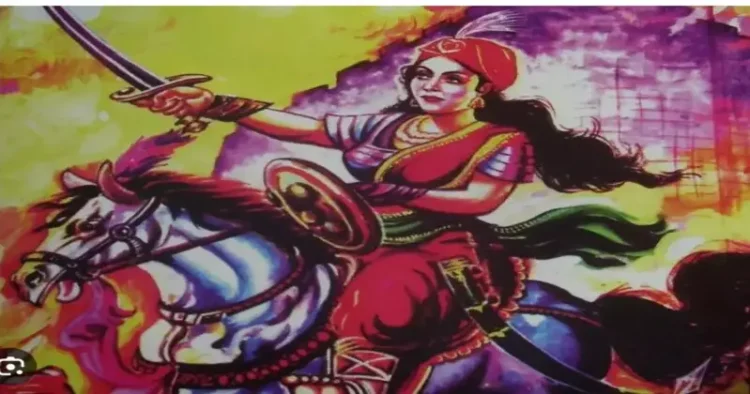While celebrating the Azadi ka Amrit Mahotsav, it is essential to unveil the lesser-known heroes of our past, and Jhalkari Bai rightfully claims her place among them. Jhalkari Bai, born into a brave tribal family, displayed exceptional courage from a young age. Revered by the Rani of Jhansi, Laxmi Bai, for her valour, Jhalkari Bai’s life remains shrouded in limited historical accounts. Much like Rani Laxmi Bai, Jhalkari Bai’s contribution to the struggle against the British was instrumental.
On November 22, 1830, in the small village of Jhansi, Jhalkari Bai’s journey began. Acknowledging her bravery, renowned poet Maithili Sharan Gupta penned a tribute:
”आकर रण में ललकारी थी, वह झांसी की झलकारी थी।
गोरो को लड़ना सिखा गई, रानी बन जौहर दिखा गई।
है इतिहास में झलकारी, वह भारत की ही नारी थी।।”
In the battlefield, a fierce cry arose, that was Jhansi’s Jhalkari. She learned to fight the British, became a queen, and displayed valour. In history, Jhalkari is the woman of India.”*
Jhalkari Bai’s audacity is evident from a childhood incident. While returning from the forest with firewood on her head, a young Jhalkari encountered a lurking threat – a cheetah preparing to pounce. Undeterred, she fearlessly struck the beast with a wooden stick, showcasing her indomitable spirit even in the face of danger.
Influenced by her early acts of bravery, Rani Laxmi Bai recognized Jhalkari Bai’s potential and appointed her as the commander of the women’s army. During the First War of Independence in 1857, when the British forces besieged Rani Laxmi Bai, it was Jhalkari Bai who led a daring escape, allowing the queen to continue her resistance against the British.
Jhalkari Bai’s valour was not limited to strategic planning; she actively participated in battles, thwarting multiple attacks by the British forces. Her bravery became a source of inspiration for both the Indian and British armies, as her astuteness and patriotism became apparent in every confrontation.
Little is known about Jhalkari Bai’s personal life, but her father played a pivotal role in shaping her destiny. After losing her mother at a young age, Jhalkari was raised like a son by her father, imparting equestrian and weaponry skills. These early lessons moulded her into a formidable warrior.
Married to a brave soldier named Puran Kori, Jhalkari Bai’s alliance brought together two courageous individuals. Their union not only reflected a matrimonial bond but also a partnership in the fight against colonial oppression. Jhalkari Bai actively participated in battles, displaying proficiency in using firearms, cannons, and swordsmanship.
Contradictory accounts surround the circumstances of Jhalkari Bai’s later life. Some suggest that the British officer Hugh Rose secured her release, acknowledging her bravery. Others claim that she faced the gallows, joining the ranks of those who sacrificed their lives for the cause.
Numerous authors from Bundelkhand have penned the saga of Jhalkari Bai’s bravery. Chokhe Lal composed an epic Mahakavya, while Bhawani Shankar Visharad meticulously documented her life. Today, in Agra, a city known for its historical significance, a statue on horseback commemorates Jhalkari Bai’s indomitable spirit.
Today, as we celebrate the Amrit Mahotsav of freedom, let us not forget the unsung heroes like Jhalkari Bai, whose valour contributed significantly to the independence struggle. Her story serves as a beacon of inspiration, urging us to remember and honour the countless individuals who selflessly fought for the freedom we cherish today.

















Comments